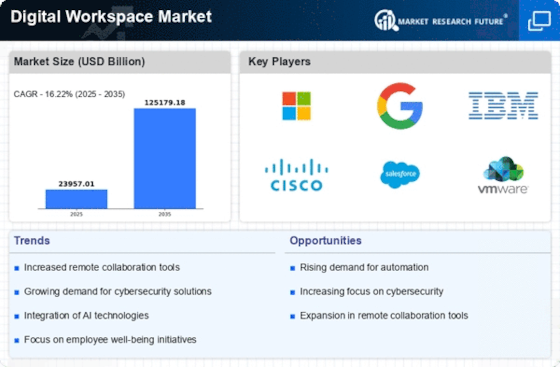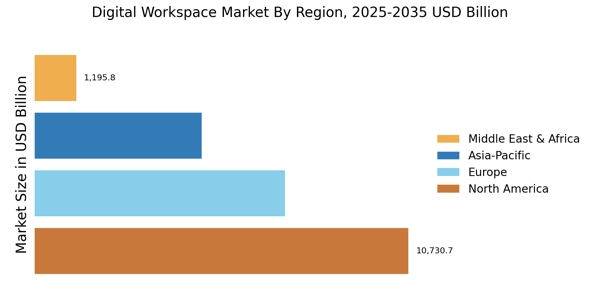Rise of Remote Work Culture
The Digital Workspace Market Industry is experiencing a notable rise in remote work culture, which has become a defining characteristic of modern employment. Organizations are increasingly adopting flexible work arrangements, allowing employees to work from various locations. This shift is driven by the need for enhanced work-life balance and the desire for greater autonomy among workers. According to recent data, approximately 30% of the workforce is now engaged in remote work, a trend that is likely to continue. This transformation necessitates robust digital workspace solutions that facilitate collaboration, communication, and productivity, thereby propelling the growth of the Digital Workspace Market Industry.
Integration of Advanced Analytics
The integration of advanced analytics into digital workspaces is becoming a pivotal driver for the Digital Workspace Market Industry. Organizations are increasingly leveraging data analytics to gain insights into employee performance, project management, and operational efficiency. By utilizing analytics tools, companies can make informed decisions that enhance productivity and streamline workflows. The analytics market is projected to grow significantly, with estimates suggesting it could reach USD 200 billion by 2025. This trend indicates that organizations are recognizing the value of data-driven decision-making, which is likely to shape the future landscape of the Digital Workspace Market Industry.
Emphasis on Cybersecurity Solutions
In the context of the Digital Workspace Market Industry, the emphasis on cybersecurity solutions is intensifying as organizations seek to protect sensitive data and maintain compliance with regulations. With the rise of remote work and digital collaboration, vulnerabilities to cyber threats have increased significantly. Organizations are investing in advanced cybersecurity measures, including encryption, multi-factor authentication, and threat detection systems. The cybersecurity market is expected to grow to USD 300 billion by 2024, indicating a strong correlation with the expansion of the Digital Workspace Market Industry. This focus on security not only safeguards organizational assets but also fosters trust among employees and clients.
Focus on Sustainability Initiatives
The Digital Workspace Market Industry is also influenced by a growing focus on sustainability initiatives. Organizations are increasingly adopting eco-friendly practices, which include reducing their carbon footprint through digital solutions. The shift towards remote work and digital collaboration tools is seen as a way to minimize travel-related emissions and resource consumption. Recent studies suggest that companies implementing sustainable practices can enhance their brand reputation and attract environmentally conscious consumers. This trend is likely to drive innovation within the Digital Workspace Market Industry, as organizations seek to align their operations with sustainability goals.
Growing Demand for Collaboration Tools
The Digital Workspace Market Industry is witnessing a growing demand for collaboration tools that enable seamless communication among distributed teams. As organizations expand their geographical reach, the need for effective collaboration becomes paramount. Tools such as video conferencing, project management software, and real-time document sharing are increasingly being integrated into digital workspaces. Recent statistics indicate that the market for collaboration tools is projected to reach USD 50 billion by 2026, reflecting a compound annual growth rate of over 15%. This surge in demand underscores the importance of collaboration in enhancing productivity and engagement within the Digital Workspace Market Industry.
















